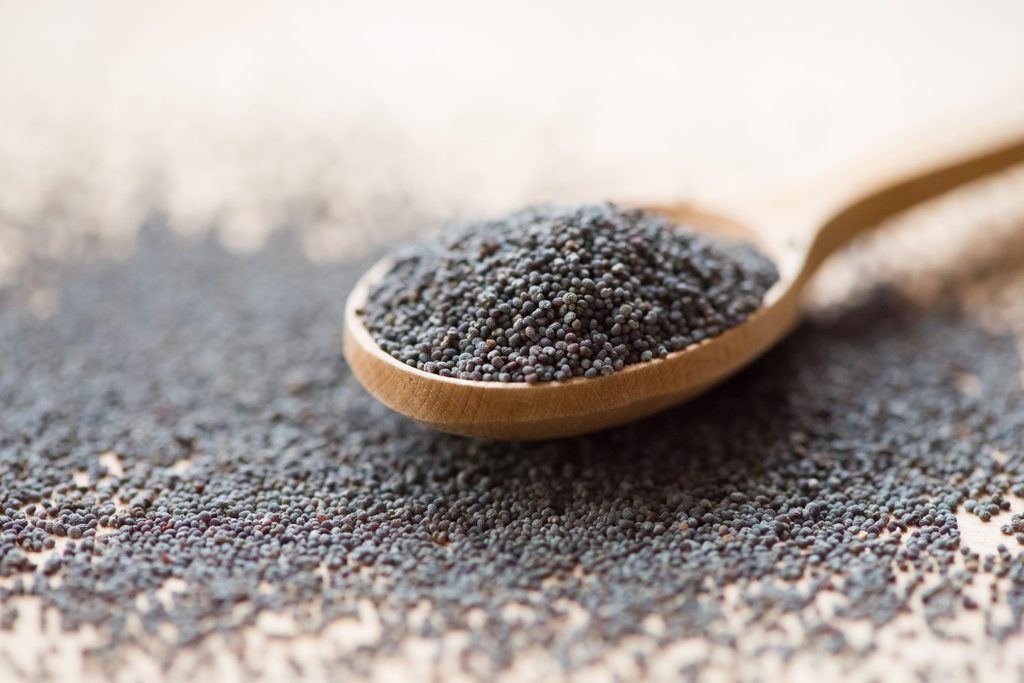Eating Poppy Seeds? Here Are the Health Benefits, Nutrition, and Risks

Tiny but mighty, poppy seeds pack a powerful punch. Here's what you need to know about their nutrition, health benefits, and possible risks.
You may know them best as something sprinkled on top of a bagel, but poppy seeds are more than just a breakfast topping. These crunchy specks offer nutritional benefits and are used globally in all sorts of baked goods and dishes.
Poppy seeds come from the poppy plant, which people have turned to for centuries as the source of opium for pain relief and for ailments like cough and diarrhea.
Poppy seeds don’t have the same opiate properties as the plant they come from, but there are some things you should know about eating them.
Read on to learn more about the benefits and nutritional value of poppy seeds, and how they can impact your overall health.
(Related: 14 Things Doctors Eat for Breakfast Everyday)
What are poppy seeds?
The poppy plant is native to the Eastern Mediterranean, but eventually spread to other temperate parts of the world. Poppy seeds are tiny; depending on where they’re cultivated, they can vary in color, although they’re usually black.
“Poppy seeds are kidney-shaped seeds from the opium poppy,” says Jennifer Silverman, holistic nutritionist based in New York City. “They are typically used to add flavor, texture and crunch to food.”
Poppy seeds can be eaten whole, ground up and added to a meal, or pressed for poppy seed oil.
Nutrition facts on poppy seeds
Poppy seeds are a source of fibre, which helps to keep you feeling full for longer periods of time. They also contain magnesium, which helps with bone health and blood clotting, and calcium, which also plays a role in bone health.
According to the USDA, one teaspoon of poppy seeds contains the following nutrients:
- Fat: 1.2 g
- Calories: 14.7 kcal
- Sodium: 0.7 mg
- Total Carbohydrates: 0.8 g
- Dietary Fibre: 0.5 g (about 2 percent of the daily value)
- Total Sugars: 0.1 g
- Protein: 0.5 g
- Calcium: 40 mg (3 to 4 percent of the recommended daily intake, RDI, for adults)
- Iron: 0.3 mg (1.5 percent of the RDI for adult women)
- Magnesium: 9.7 mg (2 percent of the RDI)
- Manganese: 0.2 mg (8 percent of the RDI)
(Related: How to Choose the Best Food Habits For Your Health)
Health benefits of poppy seeds
Poppy seeds are rich in certain vitamins, and minerals. They also contain macronutrients (fats, proteins, and carbs).
“Manganese is a trace mineral with lots of benefits,” says Silverman. “It helps with bone health, bone mineral density, and blood clotting.” It’s also associated with proper liver function and nutrient metabolism, Silverman adds.
Poppy seeds can also be pressed to make poppy seed oil, which has Omega-6 and Omega-9 fats, which have been found to improve overall health and lower risk of cardiovascular disease. “Poppy seeds and poppy seed oil also contain polyphenols, an antioxidant associated with a reduced risk of heart disease,” says Silverman.
Poppy seed oil contains oleic acid, which may help to heal wounds on the skin. According to the Journal of Drug Delivery and Therapeutics, poppy seeds and poppy seed oil have historically been used to treat headaches, coughs, asthma, and even insomnia. There is little research to back their effectiveness, however.
Poppy plants contain the opium alkaloids morphine, codeine, and thebaine (among other compounds), which are known for their pain-relieving and sleep-inducing abilities. Poppy seeds don’t naturally contain these opioid compounds but they can become contaminated during processing and remain that way if unwashed.
Poppy seeds and weight loss
Because poppy seeds are a source of fibre, magnesium, calcium, and healthy fats, these seeds can be a good addition to a healthy diet. Poppy seeds are also low in cholesterol and sodium.
Poppy seed risks and side effects
Small amounts of codeine and morphine may show up in a urine drug test after you eat poppy seeds, according to a report in the Journal of Analytical Toxicology.
But washed poppy seeds don’t naturally contain opium compounds, Silverman explains. Unwashed seeds can cause problems if they were exposed to opiates when they were harvested.
“This is why people say if you eat them before a drug test, you could test positive for opium,” says Silverman. “Consequently, they’re cleaned thoroughly before hitting the shelves of your favorite grocery stores.”
While unwashed poppy seeds (or teas that contain them) are sometimes promoted as a sleep aid or pain reliever, they aren’t safe—in large quantities they can contain enough opioid compounds to lead to dependency, overdose, and withdrawal, and can even be potentially life-threatening.
That said, poppy seeds purchased at supermarkets and grocery stores and consumed in small quantities are safe.
(Related: 10 Foods With More Fibre Than Broccoli)
Best way to eat poppy seeds
Poppy seeds are found in many bakery products, like bagels or lemon poppy muffins, but they also can be added to salads and vegetables.
“I would use them as a topping, to add some crunch to my favorite cottage cheese or on top of a piece of avocado toast,” says Silverman. “I may also top off a salad or veggie bowl with them.”
Ready to give them a try? Get the recipe for our honey poppy seed fruit salad.
Next: Should You Be Eating Chia Seeds? Here’s What Nutritionists Say




